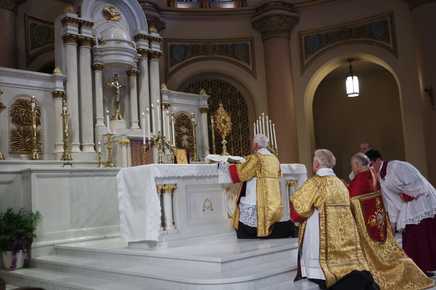 Exposing the Blessed Sacrament during a recent confirmation Mass at Star of the Sea with Archbishop Cordileone.
Exposing the Blessed Sacrament during a recent confirmation Mass at Star of the Sea with Archbishop Cordileone. To properly mark this liturgical transition, I went with friends to Handel’s Messiah last night at Symphony Hall. The oratorio never fails to inspire even the most jaded heart because it sings the Word of God with such graceful beauty. The good Lutheran G.F. Handel has long won the world over through his winning choruses and arias. But what is it about the sacred score that so lightens our spirits? Few leave a Verdi opera or a Rolling Stones concert with that special smile and spring in our step that Handel’s Messiah gives to us.
Messiah gives us this lightness of spirit, I think, because it restores the world to its proper order—it portrays man in the image of God, rather than gods in the image of men. The chorus was not singing about itself last night when it rang out “Lord of Lords and King of Kings.” The soprano declared (with inspiring power and beauty) that she would live forever, but not through her own power: “I know that my Redeemer liveth,” she sang, “and though worms destroy this body, yet in my flesh shall I see God.” What a relief to hear music that focuses about someone other than ourselves! We are accustomed to self-absorbed art and entertainment, but Messiah offers something much more liberating. Sacred music, like other art forms, celebrates humanity, but humanity as God’s creation. Man is fascinating and beautiful not in himself, but precisely in relationship with others, and fundamentally with the Other, as the beloved of God. Without a reference beyond himself, the human person is incomprehensible. It would be as if astronomers would try to understand planet earth apart from the surrounding universe, as if earth were the center of reality. There is a center, but we are not it. There is a God, and we are not He.
So Messiah turns the focus of the art and entertainment from man to God. As others have more eloquently pointed out, worship should do the same. Our Sunday Mass should focus on God and not ourselves, which is why a congregation that faces itself is doomed to boredom. Beginning this Ash Wednesday, I hope to try ad orientem worship for a few months at my parish. There are parts in the Mass where the priest speaks to the people (readings, homily, blessings, etc), and there are parts where he speaks to God (collects, Eucharistic Prayer, Kyrie and Gloria, etc). Some may find it odd, but actually all I’m asking is to be able to face God when I pray to God (symbolically by looking towards the altar and crucifix, literally by looking towards the tabernacle).
Everyone else in the church gets to do it! Why can’t I?


 RSS Feed
RSS Feed